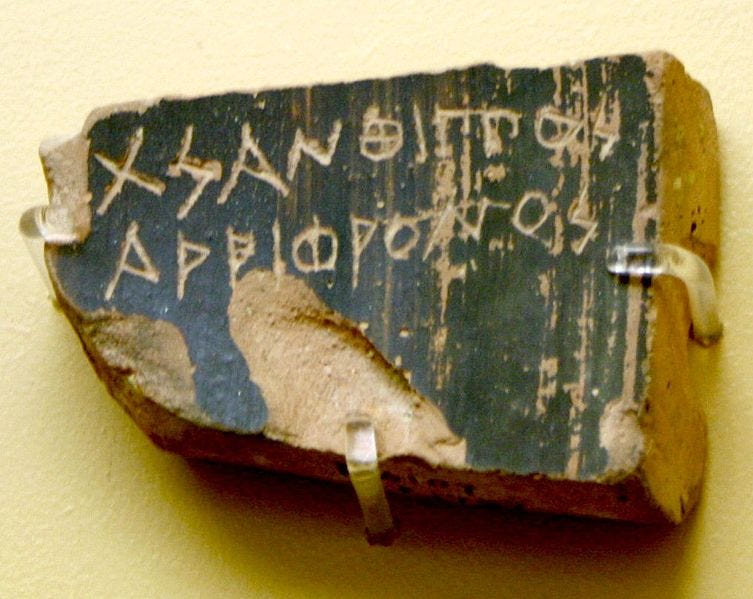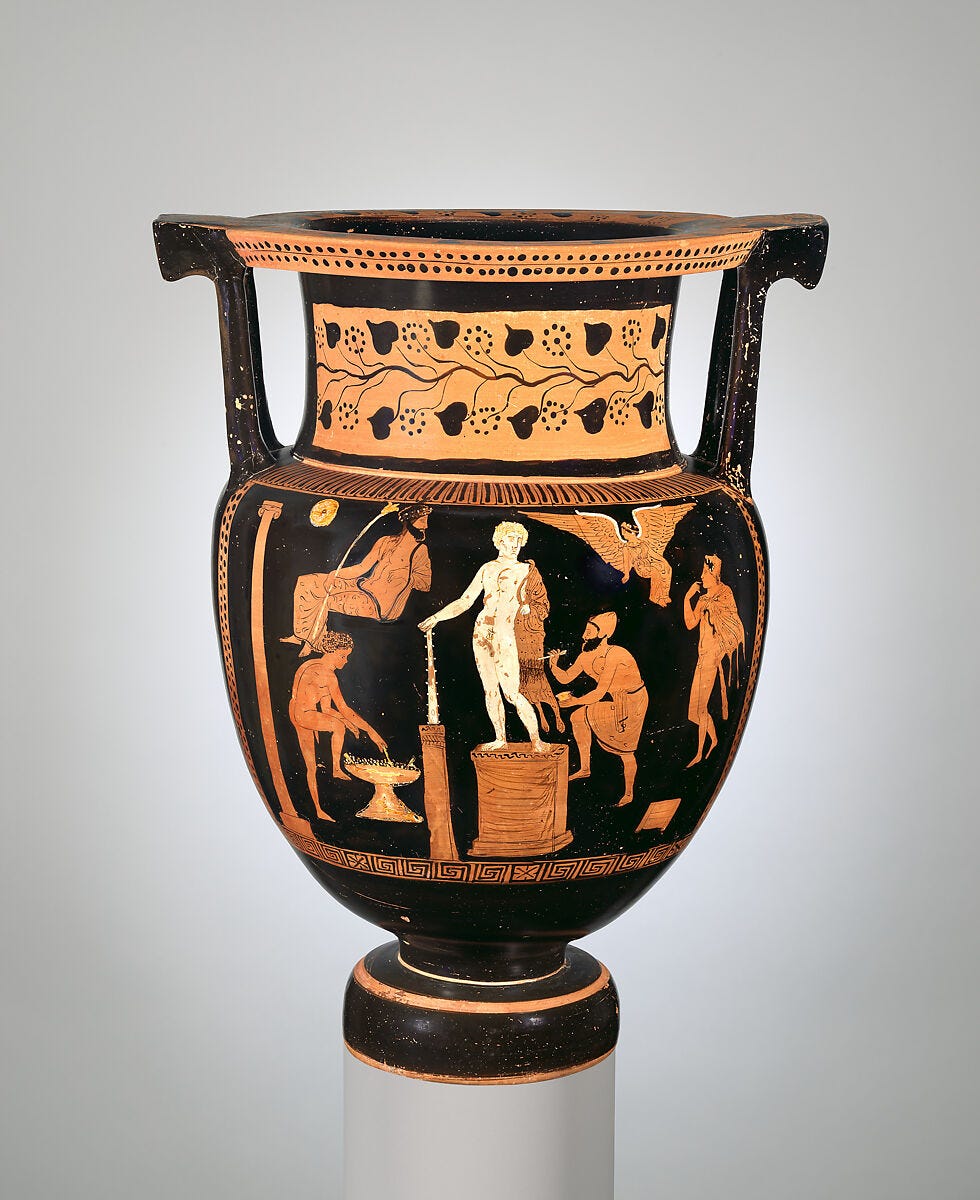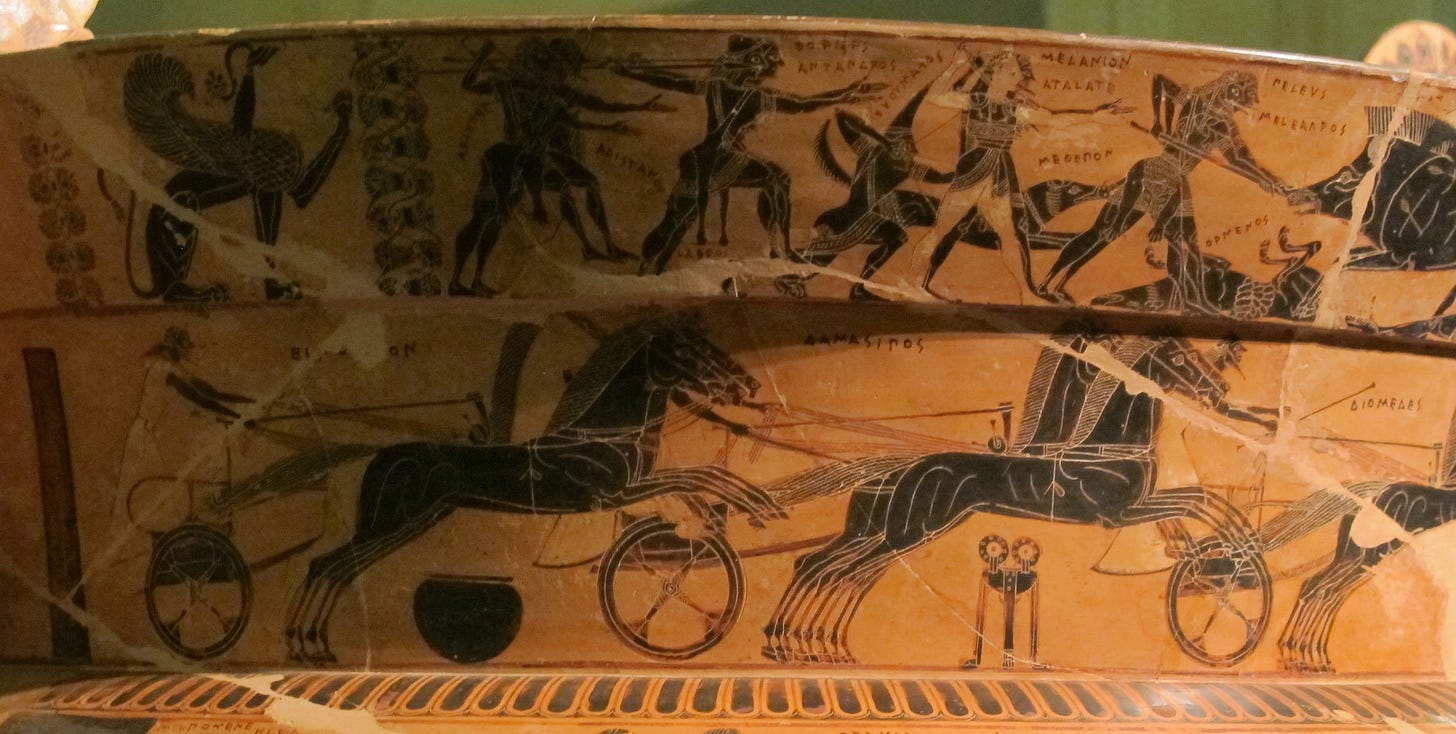This post is a continuation of my substack on the Iliad. All proceeds from the substack are donated to classics adjacent non-profits on a monthly basis. Last year this substack provided over $2k in charitable donations.
At the beginning of book 9, Agamemnon addresses the assembly as he weeps (13-16) and repeats much of his “test” in book 2, but this time he may be serious: he really wants to go home. As the Achaeans stand silent in response, Diomedes reprimanding him:
Iliad 9.29-51
“So Agamemnon spoke and everyone sat there in silence.
The sons of the Achaeans were quiet for a long time.
Then finally, indeed, Diomedes, good at the war cry, spoke among them.
“Son of Atreus, I will fight with you first when you’re being foolish.
This is right, lord, in the assembly. So don’t get angry at all.
You have reproached my bravery among the Danaans,
Calling me a coward and not a warrior. Everyone knows
These things, the young and the old Argives alike.
But the son of crooked minded Kronos gave you a double-sided gift:
He granted that you be honored above everyone because of your scepter,
But he did not grant you courage, and this is the mightiest thing of all.
Godly one, do you really expect the songs of the Achaeans
To all be cowards and unwarlike as you claim here in public?
If your heart really urges you to go home,
Then go. The road is there. Your ships are near the sea,
The many ships that followed you here from Mycenae.
But the rest of the long-haired Achaeans will stay here
Until we sack Troy. But even if they want, let them flee
In their ships back to their dear homelands.
The two of us—Sthenelos and I—we will fight until we find the end
Of Troy. For we came here with the god.”
So he spoke, and all of the songs of the Achaeans shouted out,
Praising the speech of Diomedes, the tamer of horses.῝Ως ἔφαθ’, οἳ δ’ ἄρα πάντες ἀκὴν ἐγένοντο σιωπῇ.
δὴν δ’ ἄνεῳ ἦσαν τετιηότες υἷες ᾿Αχαιῶν·
ὀψὲ δὲ δὴ μετέειπε βοὴν ἀγαθὸς Διομήδης·
᾿Ατρεΐδη σοὶ πρῶτα μαχήσομαι ἀφραδέοντι,
ἣ θέμις ἐστὶν ἄναξ ἀγορῇ· σὺ δὲ μή τι χολωθῇς.
ἀλκὴν μέν μοι πρῶτον ὀνείδισας ἐν Δαναοῖσι
φὰς ἔμεν ἀπτόλεμον καὶ ἀνάλκιδα· ταῦτα δὲ πάντα
ἴσασ’ ᾿Αργείων ἠμὲν νέοι ἠδὲ γέροντες.
σοὶ δὲ διάνδιχα δῶκε Κρόνου πάϊς ἀγκυλομήτεω·
σκήπτρῳ μέν τοι δῶκε τετιμῆσθαι περὶ πάντων,
ἀλκὴν δ’ οὔ τοι δῶκεν, ὅ τε κράτος ἐστὶ μέγιστον.
δαιμόνι’ οὕτω που μάλα ἔλπεαι υἷας ᾿Αχαιῶν
ἀπτολέμους τ’ ἔμεναι καὶ ἀνάλκιδας ὡς ἀγορεύεις;
εἰ δέ τοι αὐτῷ θυμὸς ἐπέσσυται ὥς τε νέεσθαι
ἔρχεο· πάρ τοι ὁδός, νῆες δέ τοι ἄγχι θαλάσσης
ἑστᾶσ’, αἵ τοι ἕποντο Μυκήνηθεν μάλα πολλαί.
ἀλλ’ ἄλλοι μενέουσι κάρη κομόωντες ᾿Αχαιοὶ
εἰς ὅ κέ περ Τροίην διαπέρσομεν. εἰ δὲ καὶ αὐτοὶ
φευγόντων σὺν νηυσὶ φίλην ἐς πατρίδα γαῖαν·
νῶϊ δ’ ἐγὼ Σθένελός τε μαχησόμεθ’ εἰς ὅ κε τέκμωρ
᾿Ιλίου εὕρωμεν· σὺν γὰρ θεῷ εἰλήλουθμεν.
῝Ως ἔφαθ’, οἳ δ’ ἄρα πάντες ἐπίαχον υἷες ᾿Αχαιῶν
μῦθον ἀγασσάμενοι Διομήδεος ἱπποδάμοιο.
This speech has been important in looking at the politics of the Iliad and among the Achaeans in general. Richard Martin has looked at this speech and Nestor’s response as part of positioning the old Pylian as the epic’s ideal speaker (1989, 91), while Dean Hammer (2002), Elton Barker (2009) and David Elmer (2015) have seen Diomedes’ intervention as important in signaling either extant or developing rules about speech in public. In short, Diomedes can be seen as establishing the right to dissent from the king in public for the public good.
And, yet, the story isn’t as simple as that, because Nestor needs to intervene
Iliad. 9.63-65
‘Son of Tydeus, you are strong in war
and in counsel you are the best among all those your age.
Surely no one will reproach this speech, however many Achaians there are,
nor will anyone speak back, but you have not reached the fullness of speech (télos múthôn).
Really, you are young, and you could even be my child,
the youngest by birth, but you utter knowing things
before the kings of the Argives, since you speak according to tradition (katà moîran).
But come, I, who proclaim to be older than you,
will speak out and go through everything, no one will dishonor
my mûthos, not even strong Agamemnon.
Brotherless, lawless, and homeless is that man
who longs for horrible civil war.’
τοῖσι δ’ ἀνιστάμενος μετεφώνεεν ἱππότα Νέστωρ·
Τυδεΐδη περὶ μὲν πολέμῳ ἔνι καρτερός ἐσσι,
καὶ βουλῇ μετὰ πάντας ὁμήλικας ἔπλευ ἄριστος.
οὔ τίς τοι τὸν μῦθον ὀνόσσεται ὅσσοι ᾿Αχαιοί,
οὐδὲ πάλιν ἐρέει· ἀτὰρ οὐ τέλος ἵκεο μύθων.
ἦ μὲν καὶ νέος ἐσσί, ἐμὸς δέ κε καὶ πάϊς εἴης
ὁπλότατος γενεῆφιν· ἀτὰρ πεπνυμένα βάζεις
᾿Αργείων βασιλῆας, ἐπεὶ κατὰ μοῖραν ἔειπες.
ἀλλ’ ἄγ’ ἐγών, ὃς σεῖο γεραίτερος εὔχομαι εἶναι,
ἐξείπω καὶ πάντα διίξομαι· οὐδέ κέ τίς μοι
μῦθον ἀτιμήσει’, οὐδὲ κρείων ᾿Αγαμέμνων.
ἀφρήτωρ ἀθέμιστος ἀνέστιός ἐστιν ἐκεῖνος
ὃς πολέμου ἔραται ἐπιδημίου ὀκρυόεντος.
Nestor’s speech reflects the danger imminent in Diomedes’ words. But his response is agile and sensitive to the situation. Nestor endorses Diomedes’ dissent while simultaneously mitigating its effects. He concedes that Diomedes has spoken katá moîran, but adds that he, who is older, will explain everything). That Nestor in no way contradicts Diomedes’ claim that it is right (thémis) to fight with a foolish leader in the assembly (agorê) implies a tacit approval of this contention.
Nestor continues with a subtle affirmation of and remonstration with Tydeus’ son—he diminishes Diomedes’ standing, appropriates his words, and amplifies his own position before he proceeds to advise. He does this by first reasserting the importance of his age—he compliments Diomedes, but reminds him that, by virtue of his youth, he is inferior in boulê. Nestor, however, hedges his compliments with one reservation: Diomedes’ has not reached the télos múthôn.
What does this phrase mean? The A scholia gloss it as “you will not place a completion on your words” (Schol. A Il. 9.56 ex. 1-2. Cf. Schol. D Il. 9.56 ex. 3-8.). Cedric Whitman suggests that Nestor criticizes Diomedes for stopping short, that there is more to be said (1958, 167). One implication is that Diomedes fails to do what Nestor does, namely, to dissolve the assembly and cope with Agamemnon’s crisis in the council of kings where he proposes clear and pragmatic alternatives to Agamemnon’s foolishness. This suggestion is echoed by the D scholia (Schol. D Il. 9.56 ex. 3-8).
A scarcity of parallels inhibits a complete analysis of the phrase télos múthôn, but there are enough to make a start. Martin’s refinement of the meaning of mûthos as either a command/proposal, or a boast/threat provides a useful starting point. Near the end of book 9 (9.625) Ajax tells Odysseus that the embassy should leave because there will not be a a completion or fulfillment of the mûthos (Nestor’s plan to propitiate Achilles), i.e., it will not achieve its intended perlocutionary effect. In book 16, Achilles requests for Patroklos to assent to his words and follow his plan completely (16.83:). In book 19 Agamemnon’s Hera taunts Zeus by claiming that he will not place a télos on his mûthos (107), which also signals a completion or fulfillment of the proposal/plan made in his speech (that a son, born that day, would reign among men). Again, in book 20, Hektor assures the Trojans that Achilles will not bring a completion to his plans or threats (369). Finally, in book 16, when Patroklos tells Meriones to stop taunting since “the télos of war is in hands, and the télos of words in council” (16.630) it seems that words find their télos (in an Aristotelian sense) in council.

The “fullness of múthoi” implies a recognition of traditional “rules” of critical speech, including identity of speaker, propriety of speech-type and accord with speech-context as well as an emphasis on the outcome of the speech, that a “full” mûthos in the context of the assembly offers a plan in such a way that the speaker achieves his intended effect and contributes to social cohesion. Nestor’s subsequent words offer supporting details for these rules.
First, Nestor takes great pains to remind Diomedes of his youth. While declaring the unassailability of his own words, Nestor implies that Diomedes is “out of line” because of his age. Second, Nestor’s remarkably strong condemnation of civil strife evokes the destabilizing threat of Diomedes’ dissent. The social context (in front of the whole assembly) of Diomedes’ criticism represents a threat to the social order (but, surely, no less a threat than Agamemnon’s cowardice represents to the safety of the army). Finally, Nestor’s own words are instructive for what Diomedes should have done. In his speech he dissolves the assembly and calls for Agamemnon to hold a boulê, and it is there where he is critical of the king and formulates a course of action.
Thus, I believe that the phrase télos múthôn conveys an array of meanings. On one level, Nestor may imply that Diomedes’ “plan” to take Troy alone is untenable. On another, the phrase conveys traditional guidelines or limits on the use of speech. Such criticism of the commander-in-chief in the context of the assembly is dangerous for the Achaians and may be beyond the acceptable norm for the youngest of the gérontes. Diomedes’ challenge has the potential to confuse the assembly and further destabilize Achaian authority. Rather than allow another argument (Achilles and Agamemnon in book 1) or leaving space for a negative appraisal of the king (Thersites) Nestor, as neutrally as possible, ends the assembly and deals with Agamemnon in the more private context of the council.
As I argue in a few places, I believe that the Iliad uses Diomedes to demonstrate how a younger man may develop into a stronger role through public speaking. For illustration, I include a brief summary of his story:
(1) Diomedes (implicitly) witnesses the actions and speeches of Iliad 1-3
(2) D. shows he knows the appropriate parameters for political and martial speech (Il. 4)
(3) D. practices public speech and is acclaimed by all the Achaians in his refusal of Paris’ offer to return the gifts but not Helen (7.400-2). Acclamation (7.403-4)
(4) D. practices public speech in criticizing Agamemnon and is acclaimed by all (9.50-1) but is criticized by Nestor for not reaching the télos múthôn (9.53-62). Acclamation (9.50-1)
(5) D. practices public speech in reaction to Achilles’ rejection of the assembly (9.697-709) and is acclaimed by all the kings. Acclamation (9.710-11)
(6) D. volunteers to go on a nocturnal spying mission during the council of kings and is encouraged by Agamemnon to choose any companion he wants regardless of nobility (10.219-39)
(7) D. executes public critical speech and offers a plan (14.110-32). He is obeyed by all the kings and departs from the epic as a speaker. Acclamation (14.133)
Note the increasing political impact of Diomedes’ speeches and the corresponding development in who approves his oratory.
When we talk about freedom of speech, it is political: it is dissent from the status quo. It also functions to reinforce who matters within a community. In the earliest Ancient Greek reflection on public speech, the right to dissent is essential when the Iliad’s Agamemnon brings a plague upon his people and Achilles challenges. Of course, the story is complex: Thersites in the second book is prevented by who he is from criticizing the king. His body, his voice, his departure from normal conventions and appearance, disqualify him from making the very same arguments Achilles made in book 1. In contrast, the Achilles-replacement Diomedes asserts in book 9 that it is right to argue with a foolish king in public.
From what we now call Classical Greece, we find parrhêsia, what a modern free speech advocate might call “frank and open debate”—for criticizing your friends in private and also for expressing unpopular opinions in public for the benefit of the state. In addition, “equal access to public speech” (isêgoria) promises that each citizen be given that opportunity. Sure, speech that is just about one’s own opinion–or personal brand–is ‘protected’ in the U.S., but is it sacred in the way so many claim?
Any notion of free speech from this perspective is rooted in its contribution to the public good. But who gets to contribute is constrained by who counts. In the Iliad, the ugly and disabled Thersites is beaten for speaking freely. In the United States, cries lamenting lost freedom of speech have long been rooted in supporting the status quo rather than increasing and encouraging political participation. Consider how the chartering of the right to political speech in the Iliad is explored within the frame of balancing the character of the body of the speaker against the safety of the body politic.
Other posts for Iliad 9
Life, Death, and all the Words Between: Iliad 9 and the Language of Achilles: Achilles: Character Language; Heroism
Two Is Company! The Duals of Iliad 9 and Homeric Interpretation: Duals; Homeric Innovation and traditional language
Achilles Sings the Hero Within: Stories and Narrative Blends in Iliad 9: Paradeigmata, again; cognitive approaches to reading the Iliad

A Short bibliography on Diomedes
n.b this is not an exhaustive bibliography. If you’d like anything else included, please let me know.
Andersen, Öivind. 1978. Die Diomedesgestalt in der Ilias. Oslo.
Barker, Elton T. E. “Achilles’ Last Stand: Institutionalising Dissent in Homer’s Iliad.” PCPS 50 (2004) 92-120.
—,—. Entering the Agôn: Dissent and Authority in Homer, Historiography and Tragedy. Oxford, 2009.
Burgess, Jonathan. 2001. The Tradition of the Trojan War in Homer and the Epic Cycle. Baltimore.
—,—. 2009. The Death and Afterlife of Achilles. Baltimore.
Christensen, Joel P. 2009. “The End of Speeches and a Speech’s End: Nestor, Diomedes, and the telos muthôn.” in Kostas Myrsiades (ed.). Reading Homer: Film and Text. Farleigh Dickinson University Press, 136-62.
Christensen, Joel P. and Barker, Elton T. E.. “On not remembering Tydeus: Agamemnon, Diomedes and the contest for Thebes.” Materiali e Discussioni per l’Analisi dei Testi Classici, no. 66, 2011, pp. 9-44.
Christensen, Joel P. 2015. “Diomedes’ Foot-wound and the Homeric Reception of Myth.” In Diachrony, Jose Gonzalez (ed.). De Gruyter series, MythosEikonPoesis. 2015, 17–41.
Donlan, Walter. “The Unequal Exchange between Glaucus and Diomedes in Light of the Homeric Gift-Economy.” Phoenix, vol. 43, no. 1, 1989, pp. 1–15. JSTOR, https://doi.org/10.2307/1088537. Accessed 2 Oct. 2023.
Dunkle, Roger. 1997. “Swift-Footed Achilles.” CW 90: 227-34
Elmer, David. The Poetics of Consent: Collective Decision Making and the Iliad. Baltimore, 2013.
Fineberg, Stephen. “Blind Rage and Eccentric Vision in Iliad 6.” Transactions of the American Philological Association (1974-), vol. 129, 1999, pp. 13–41. JSTOR, https://doi.org/10.2307/284423.
Gaisser, Julia Haig. “Adaptation of Traditional Material in the Glaucus-Diomedes Episode.” Transactions and Proceedings of the American Philological Association, vol. 100, 1969, pp. 165–76. JSTOR, https://doi.org/10.2307/2935907.
Gantz, Timothy. 1993. Early Greek Myth. Baltimore.
Griffin, Jasper. 1980. Homer on Life and Death. Oxford: Oxford University Press.
—,—.2001. “The Epic Cycle and the Uniqueness of Homer.” in Cairns 2001: 363-84.
Hammer, Dean.“‘Who Shall Readily Obey?” Authority and Politics in the Iliad.” Phoenix 51 (1997) 1-24.
—,—. “The Politics of the Iliad.” CJ (1998) 1-30.
—,—. The Iliad as Politics: The Performance of Political Thought. Norman: University of Oklahoma Press, 2002.
Irene J. F. de Jong. “Convention versus Realism in the Homeric Epics.” Mnemosyne 58, no. 1 (2005): 1–22. http://www.jstor.org/stable/4433613.
Kakridis, Johannes Th. 1949. Homeric Researches. Lund.
Kakridis, Phanis, J. 1961. “Achilles’ Rüstung.” Hermes 89: 288-97.
Lohmann, Dieter. 1970. Dieter Lohmann. Die Komposition der Reden in der Ilias. Berlin.
Mühll, Peter von der. 1952. Kritisches Hypomena zur Ilias. Basel.
Nagy, Gregory. 1979. The Best of the Achaeans. Baltimore.
Nickel, Roberto. 2002. “Euphorbus and the Death of Achilles.” Phoenix 56: 215-33.
Pache, Corinne. 2009. “The Hero Beyond Himself: Heroic Death in Ancient Greek Poetry and Art.” in Sabine Albersmeir (ed.). Heroes: Mortals and Myths in ancient Greece. Baltimore (Walters Art Museum): 89-107.
Redfield, James. 1994. Nature and Culture in the Iliad: The Tragedy of Hektor. Chicago.
—,—. 2001. “A ‘Beautiful Death’ and the Disfigured Corpse.” in Cairns 2001: 311-41.
Rose, P. W. “Thersites and the Plural Voices of Homer.” Arethusa 21 (1988) 5-25.
—,—. “Ideology in the Iliad: Polis, Basileus, Theoi.” Arethusa 30 (1997) 151-99.
Scodel, Ruth. “The Wits of Glaucus.” Transactions of the American Philological Association (1974-), vol. 122, 1992, pp. 73–84. JSTOR, https://doi.org/10.2307/284365.
Willcock, M. 1977. 1977. “Ad hoc invention in the Iliad.” HSCP 81: 41-53.
Wilson, Donna F. Ransom, Revenge, and Heroic Identity in the Iliad. Cambridge: Cambridge University Press, 2002.





My Greek is very not good but could οὐ τέλος ἵκεο μύθων = “you haven’t told the whole story”?